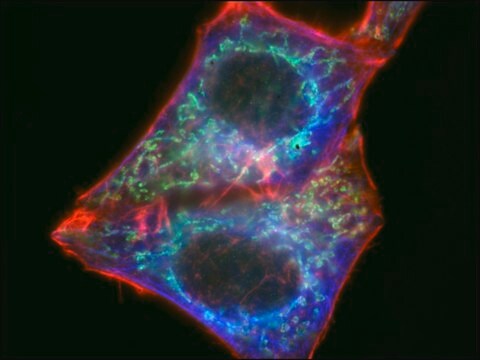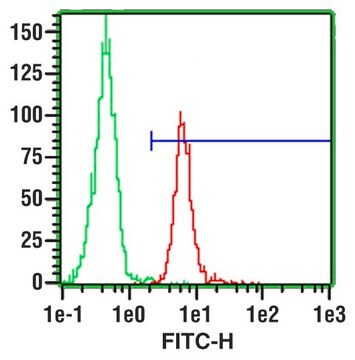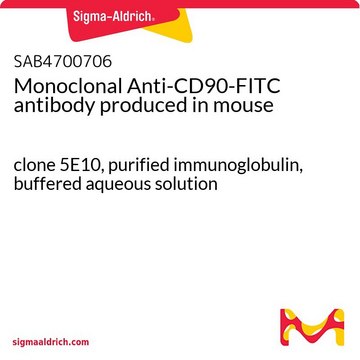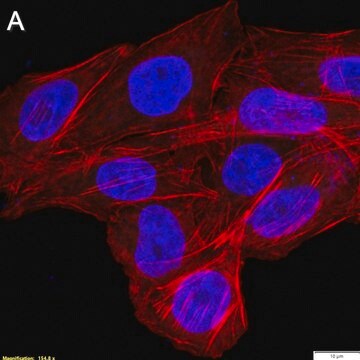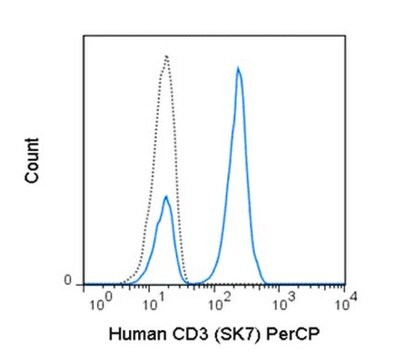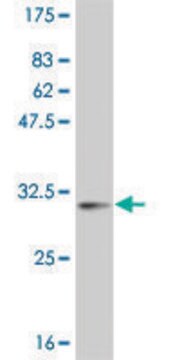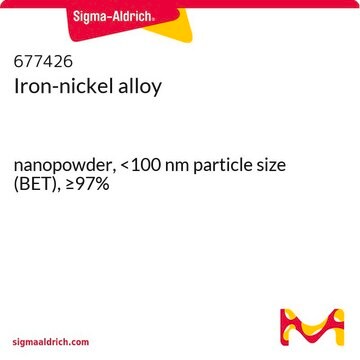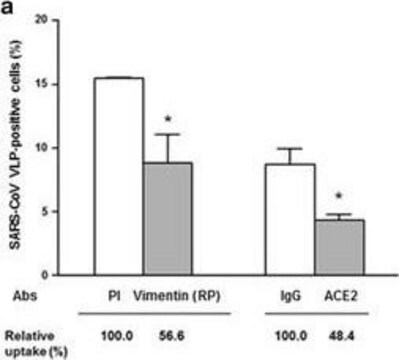SAB4700524
Monoclonal Anti-VIM antibody produced in mouse
clone VI-RE/1, purified immunoglobulin, buffered aqueous solution
Synonym(s):
Anti-Vimentin
Sign Into View Organizational & Contract Pricing
All Photos(1)
About This Item
UNSPSC Code:
12352203
NACRES:
NA.41
Recommended Products
biological source
mouse
Quality Level
conjugate
unconjugated
antibody form
purified immunoglobulin
antibody product type
primary antibodies
clone
VI-RE/1, monoclonal
form
buffered aqueous solution
species reactivity
human
concentration
1 mg/mL
technique(s)
flow cytometry: suitable
isotype
IgG1
NCBI accession no.
UniProt accession no.
shipped in
wet ice
storage temp.
2-8°C
target post-translational modification
unmodified
Gene Information
human ... VIM(7431)
Related Categories
General description
The antibody VI-RE/1 reacts with human vimentin, a 57 kDa intermediate filament protein expressed on a wide variety of mesenchymal and mesodermal cell types.
Immunogen
Bacterially expressed full-length human vimentin
Application
The reagent is designed for Flow Cytometry analysis. Suggested working dilution for Flow Cytometry is 1-10 μg/mL of sample. Indicated dilution is recommended starting point for use of this product. Working concentrations should be determined by the investigator.
Features and Benefits
Evaluate our antibodies with complete peace of mind. If the antibody does not perform in your application, we will issue a full credit or replacement antibody. Learn more.
Physical form
Solution in phosphate buffered saline, pH 7.4, with 15 mM sodium azide.
Disclaimer
Unless otherwise stated in our catalog or other company documentation accompanying the product(s), our products are intended for research use only and are not to be used for any other purpose, which includes but is not limited to, unauthorized commercial uses, in vitro diagnostic uses, ex vivo or in vivo therapeutic uses or any type of consumption or application to humans or animals.
Not finding the right product?
Try our Product Selector Tool.
Storage Class Code
10 - Combustible liquids
Flash Point(F)
Not applicable
Flash Point(C)
Not applicable
Choose from one of the most recent versions:
Already Own This Product?
Find documentation for the products that you have recently purchased in the Document Library.
Alejandra M Ruiz-Zapata et al.
Molecular human reproduction, 20(11), 1135-1143 (2014-09-06)
Pelvic organ prolapse (POP) remains a great therapeutic challenge with no optimal treatment available. Tissue maintenance and remodelling are performed by fibroblasts, therefore altered cellular functionality may influence tissue quality. In this study, we evaluated functional characteristics of fibroblastic cells
Alexandra von Baer et al.
Pathology, research and practice, 210(10), 698-703 (2014-07-01)
Extraskeletal osteosarcoma is a rare neoplasia within the broad differential diagnostic spectrum of calcifying intramuscular lesions. We present a case of a slowly increasing mass within the left vastus lateralis muscle. At first presentation the patient showed a partially calcified
Gábor Wittmann et al.
Endocrinology, 155(5), 2009-2019 (2014-03-08)
Thyroid hormone regulates immune functions and has antiinflammatory effects. In promoter assays, the thyroid hormone-activating enzyme, type 2 deiodinase (D2), is highly inducible by the inflammatory transcription factor nuclear factor-κ B (NF-κB), but it is unknown whether D2 is induced
Jamal-Eddine Bouameur et al.
The Journal of investigative dermatology, 134(11), 2776-2783 (2014-06-19)
Plectin, a cytolinker of the plakin family, anchors the intermediate filament (IF) network formed by keratins 5 and 14 (K5/K14) to hemidesmosomes, junctional adhesion complexes in basal keratinocytes. Genetic alterations of these proteins cause epidermolysis bullosa simplex (EBS) characterized by
Ayako Shiraki et al.
Toxicology letters, 228(3), 225-234 (2014-05-02)
The present study was performed to determine target gene profiles associated with pathological mechanisms of developmental neurotoxicity. For this purpose, we selected a rat developmental hypothyroidism model because thyroid hormones play an essential role in both neuronal and glial development.
Our team of scientists has experience in all areas of research including Life Science, Material Science, Chemical Synthesis, Chromatography, Analytical and many others.
Contact Technical Service